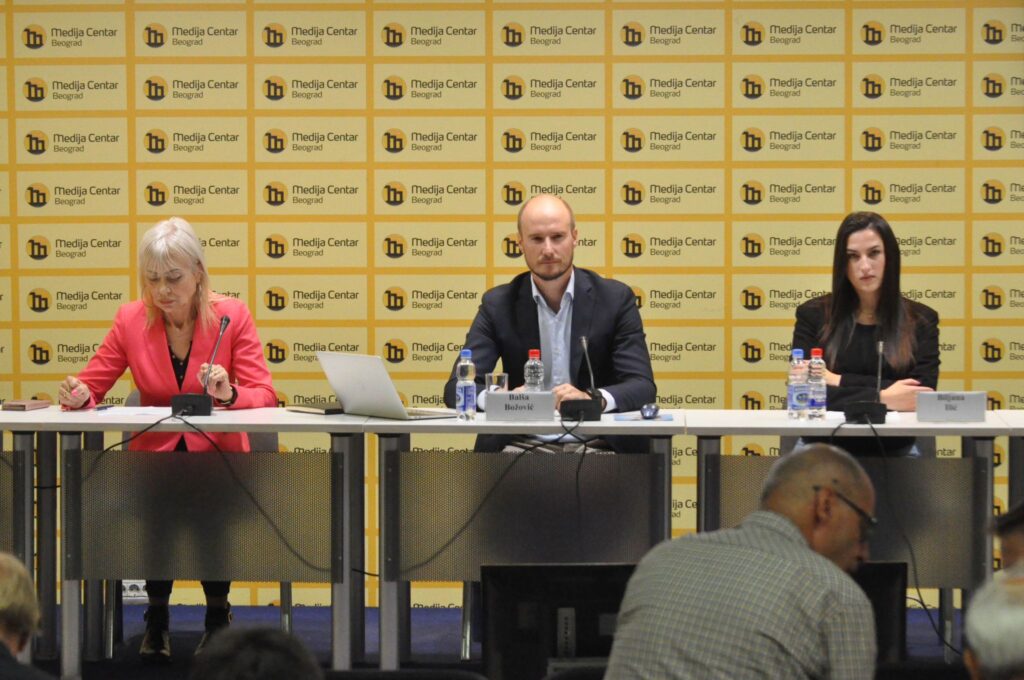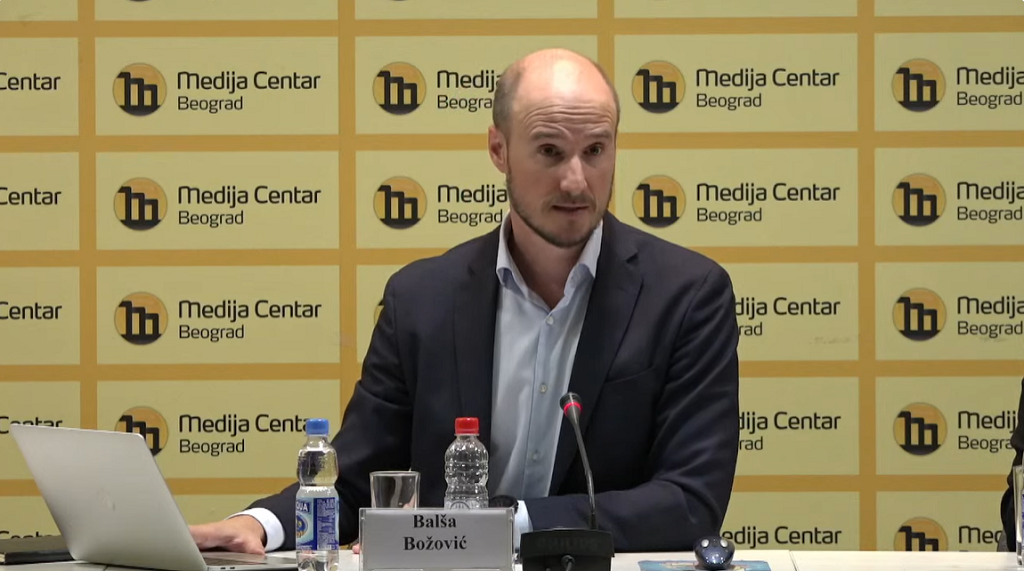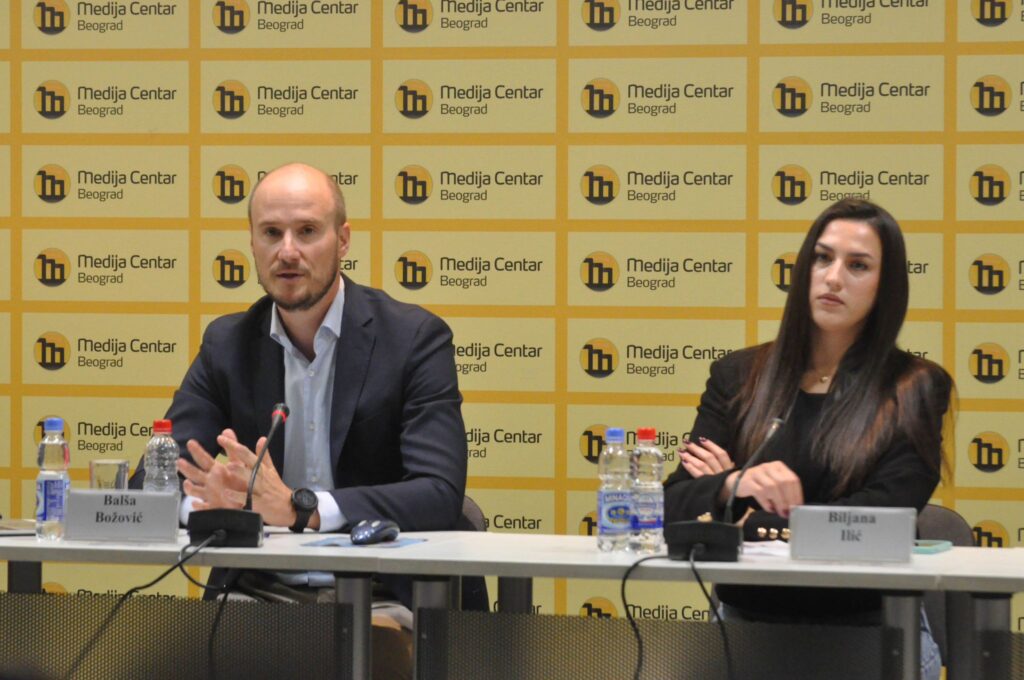The question of Montenegro’s independence is considered closed by the dominant majority of citizens of Serbia, but it is clear that the narratives heard from the authorities keep this topic within a framework that is not conducive for the development of healthy neighbourly relations. This is indicated by responses related to the insufficient degree of recognition of Montenegrin identity, the perception of the threat of Serbs in Montenegro, and Serbia’s obligation to protect them, as well as double standards in relation to religious processions as a model of political change. These are some of the key findings of the public opinion research on Serbia’s and Montenegro’s relations presented today in Belgrade at the Media Center. The research was conducted in Serbia by the Regional Academy for Democratic Development (ADD) in cooperation with the agency House of Win (HOW).
The research simultaneously conducted in Serbia and Montenegro is part of the project “Plenum on Montenegrin-Serbian Relations!” implemented by the Centre for Civic Education (CGO) from Montenegro with ADD from Serbia, and with financial support from the Embassy of Switzerland.
The research findings were presented by Balša Božović, Executive director of the ADD and Biljana Ilić, a representative of the HOW agency.
“The research findings indicate that independence for Montenegro is a closed matter for over 60% of citizens of Serbia, with one-fifth (20%) holding an opposing view, and one-fifth (19%) remaining undecided. Consequently, around one-fifth also believe that a referendum on Montenegro’s independence should be repeated or a referendum on Serbia and Montenegro’s unification held. However, it is important to emphasize that, for the majority, this is a closed issue – they have neither interest nor a differentiated opinion on it,” said Božović at the presentation.
“In line with this, approximately 60% believe that Montenegro should be independent, while less than one-fifth (18%) prefer the fiction of unification with of Serbia and Montenegro, or with Montenegro and Republika Srpska (12%), which are good indicators, given the potentially divisive conflict potential of these aspirations if they were to develop further,” Božović added.
When it comes to interstate relations, Božović stated that it is expected and positive that most citizens of Serbia think that Serbia has the closest relationships with Montenegro (27%) among the former Yugoslav states, followed by Bosnia and Herzegovina (22%), while to a lesser extent, with North Macedonia (14%), Croatia (9%), and Slovenia (8%). The percentage is negligible in the case of Kosovo (2%), and slightly less than one-fifth cannot assess the state of these relationships. From a deeper perspective, the majority view the relationship with Montenegro as neither good nor bad (37%), while less than a third consider it excellent or good (30%), and just over one-fourth (28%) view it as bad or very bad.
“Citizens of Serbia do not predominantly believe that Serbia influences the political situation in Montenegro (49%), and as much as 33% of respondents do not have a stance on this matter. Less than a fifth (18%) believe that Serbia interferes in Montenegro’s internal affairs, and even among those who recognize this influence, the prevailing view is that it is mostly insignificant rather than extensive,” Božović pointed out.
Regarding the identification of the main problems in Serbia’s and Montenegro’s relations, respondents could provide multiple answers, and the recognition of Kosovo (34%) stands out significantly as the top issue. Following that, to a much lesser extent, is the perception of the bad position of Serbs in Montenegro (13%), poor economic cooperation (9%), the issue of NATO membership (8%), and the government in Montenegro (8%). External influence from the EU and Western countries (USA, UK – 7%), Serbia’s interference in Montenegro’s internal political issues (5%), external influence from Russia (5%), poor transport connections (4%), the Serbian government (4%), the status of Montenegrins in Serbia (3%), the non-extradition of Svetozar Marović to Montenegro by the Serbian government (2%), the absence of diplomatic relations at the ambassadorial level (2%), the ban on entry for certain Serbian citizens into Montenegro/Montenegrin citizens into Serbia (1%) are relatively low on the scale of perceived problems, while as much as a fifth have no stance on these issues.
“Although Montenegro’s independence is recognized by the majority in Serbia, there is also a stance that some aspects of the two countries’ affairs should be joint. Noting that respondents could choose multiple options for this question, a significant number (almost one-third – 32%) suggest that there should be a common foreign and defence policy or economic and financial policy (26%). Interestingly, a small number recognize such an approach when it comes to practical issues, such as transport strategy (10%). On the other hand, 14% believe that Montenegro and Serbia should not have common policies, and that each should take care of their own priorities,” explained Božović.
There is a strong belief that Serbia has the right or an obligation to take care of Serbs in Montenegro – as many as 79% of Serbian citizens hold this view, while only 7% believe it’s an internal matter for Montenegro.
Presenting the research results related to foreign policy, Božović stated that Serbian citizens primarily see Russia as the main pillar in foreign policy (20%), while the EU is in second place with 15%, closely followed by China at 13%. US ranks much lower (9%), along with Montenegro (6%), Germany (5%), UK (4%), and Turkey (3%).
“These findings correspond with the prevailing narrative in most media outlets that distances Serbia from the West. Consequently, and unfortunately, only 38% of Serbian citizens support EU membership, which is the lowest percentage in the Western Balkan region, with the note that the number of those who are against (41%) is twice as large as those who are undecided (21%). Only 9% support joining the NATO, while 75% of respondents oppose it, and 16% cannot make up their minds,” emphasized Božović.
In the section of identity issues, the findings show that only a third (33%) of Serbian citizens recognize the difference of the Montenegrin identity, meaning its distinctiveness from the Serbian identity, while this is not the case for 29% of the respondents, as mentioned by Božović. A significant number of respondents (38%) do not have a stance on this issue.
Montenegrin language is not recognized by 56% of Serbian citizens, while 28% recognize it, and 16% have no opinion on the matter.
“Furthermore, the majority of Serbian citizens (60%) believe that the Serbian Orthodox Church (SOC) should not interfere in political matters in either Montenegro or Serbia. This confirms the commitment to secularism by Serbian citizens, despite negative occurences in Serbian society originating from the church itself, which the SOC also spreads in the region, specifically towards Montenegro,” Božović elaborated.
Regarding the cultural legacy represented by Njegoš, 65% of Serbian citizens believe that Njegoš is part of both Serbian and Montenegrin cultures, while only 4% see Njegoš as part of the Montenegrin culture exclusively, and just over a fifth (22%) see Njegoš solely as part of the Serbian culture.
Total of 46% of Serbian citizens believe that Serbs in Montenegro are endangered, while 32% hold the opposite view. For those who claim that there is discrimination against Serbs in Montenegro, employment and the practice of religious rights are the areas where they perceive it. On the other hand, 86% of Serbian citizens believe that Montenegrins are not endangered in Serbia.
“It is remarkably interesting that 74% of Serbian citizens state that they supported the religious processions (litije) in Montenegro during 2020, and over 50% of them believe that these precessions had a significant or partial impact on the outcome of the parliamentary elections in August 2020 in Montenegro. At the same time, the majority (45%) would not support such a model of political change in Serbia, i.e. only 24% of Serbian citizens would support this model in Serbia, and 10% partially,” Božović noted.
The Partisan movement still prevails in Serbia, with 32% of those who feel close to it, while the Chetnik movement is right behind with 29%. However, a significant number of citizens have no stance on this issue, as many as 39%.
“Only 16% of Serbian citizens believe that a genocide occurred in Srebrenica, while 52% do not share this view, and a significant 32% either cannot or do not want to take a stance on the matter. The independence of Kosovo is not supported by 73% of Serbian citizens, in contrast to 5% who do support it, with an additional 22% without an opinion on this issue. In the Russian-Ukrainian war, almost two-fifths (39%) of Serbian citizens support Russia, and only 13% support Ukraine. As much as 48% of Serbian citizens have no opinion on this war. As expected from these data, only 12% of Serbian citizens would support sanctions against Russia, while 67% are against it. On the same line, when discussing how dangerous Russian influence is for the region, the majority (48%) believe it is not, but there is also a significant number (37%) of those who think that this influence is malignant and dangerous,” said Božović.
The empirical research in Serbia was conducted by the agency House of Win (HOW) in the period from 2 to 10 October 2023, on a stratified sample of 1,844 respondents, with application of the CATI method.
As a reminder, yesterday in Podgorica CCE presented the findings of a public opinion research on the relations between Montenegro and Serbia, conducted in collaboration with the DAMAR agency as part of this joint project between the CCE and the ADD, and with the support of the Embassy of Switzerland.
The main goal of the project “Plenum on Montenegrin-Serbian Relations!” is to create a new narrative that promotes respect for good neighbourly relations, religious rights, multi-ethnicity, multiculturalism, European values, human rights, and highlights positive examples of efforts by groups and individuals during the wars and crises of the 1990s as true heroes for new generations. Specific objective is to identify the main causes of the complexity of relations between two historically related and close communities – the Serbian and Montenegrin communities – and establish a roadmap towards their significant and sustainable improvement.
Ljubica Mandić, Programme assistant, ADD



